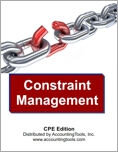Constraint Management (CPE Course)
CPE Credit: 10 hours
Course Type: Downloaded PDF materials with online test
Price (with PDF Textbook): $70
Course Description
The performance of a business can be greatly improved by closely managing a few key bottlenecks (constraints) within the organization. Constraint Management is a valuable resource for locating and managing these constraints. It does so by describing the impact of constraints and how they can be managed to optimize profitability. The text includes discussions of where the constraint may be located, how constraint analysis compares to traditional cost accounting, and how to design measurement, reporting, and control systems around a constraint. There is also extensive treatment of financial modeling around constraints, as well as how to develop constraint-based strategies. In short, this course is an invaluable guide to enhancing the performance and earnings of your business.
Author: Steven Bragg
Course Number: PR1002
Table of Contents
Chapter 1. Overview of Constraint Management
Chapter 2. Production Basis of Constraint Management
Chapter 3. Constraints in Other Departments
Chapter 4. Comparison to Traditional Cost Analysis
Chapter 5. Comparison to Accounting Frameworks
Chapter 6. Constraint and Throughput Measurement
Chapter 7. Constraint and Throughput Reporting
Chapter 8. Constraint Controls
Chapter 9. Constraint-Based Budgeting
Chapter 10. The Ideal Constraint Management Environment
Chapter 11. Financial Analysis Issues
Chapter 12. Constraint-Based Pricing
Chapter 13. Constraint Management Decisions
Chapter 14. Constraint-Based Strategy
Learning Objectives
Identify the negative issues related to local optimization, as well as the basic concepts of constraint management.
Recognize situations in which local optimization is being employed.
Cite the indicators of a constraint, as well as the means by which a constraint can be managed.
Recognize the existence of constraints in areas other than production, as well as the constraint issues involved in project management.
Specify the circumstances under which the use of increased resources in the sales area will not increase sales.
State the negative effects of cost reduction efforts, the use of gross margins, and the mis-application of direct labor costs.
Identify the cost assignments required by the major accounting frameworks.
Cite the types of measurements that can be effective in managing a constraint and throughput.
Identify the components of the various cost object analyses.
State the reasons for using constraint controls, and note the best types of controls.
Specify the project types used in capital budgeting, as well as the problems with the traditional methods used to derive a budget.
Cite the circumstances under which a constraint management environment is most likely to succeed.
Identify the key elements of a financial analysis that can improve the results of a business.
Recognize the types of pricing methodologies, and how constraint-based pricing can be used to identify the most favorable pricing opportunity.
Specify the criteria used to determine which investments and other constraint-based decisions to make.
Recognize the strategies that will be most effective under certain competitive situations.
Cite the circumstances under which constraint management is more likely to succeed.
Level: Overview
Instructional Method: QAS Self-Study
NASBA Category: Production
Prerequisites: None
Advance Preparation: None
Latest Review Date: February 2024
Program Registration Requirements: Click on "Purchase Course" near the top of this page to pay for and access the course. You will then be able to download the course as a PDF file, then take an on-line examination, and then download a certificate of completion if you pass the examination.
Program Refund Policy: For more information regarding administrative policies concerning complaints, refunds, and other matters, see our policies page.
AccountingTools, Inc. is registered with the National Association of State Boards of Accountancy (NASBA) as a sponsor of continuing professional education on the National Registry of CPE Sponsors. State boards of accountancy have the final authority on the acceptance of individual courses for CPE credit. Complaints regarding registered sponsors may be submitted to the National Registry of CPE Sponsors through its website: www.nasbaregistry.org.
The NASBA sponsor identification number for Accountingtools, Inc. is 115881.
AccountingTools is an IRS Approved Continuing Education Provider. We are compliant with the requirements for continuing education providers (as described in sections 10.6 and 10.9 of the Department of Treasury’s Circular No. 230 and in other IRS guidance, forms, and instructions). Our IRS Approved Continuing Education Provider number is 72821.


